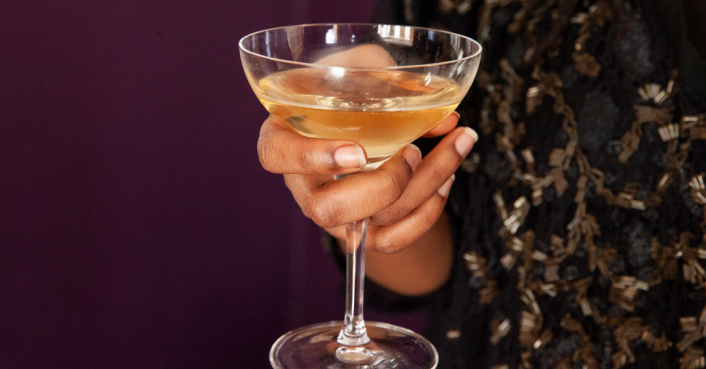Last Updated on May 19, 2023
Did you know that one in three East Asians get flushed after drinking alcohol?
This phenomenon is commonly called ‘Asian flush’ and occurs because of an inherited deficiency in one of the enzymes that break down alcohol.
The missing enzyme, aldehyde dehydrogenase, has a real life health impact for East Asians since drinking alcohol actually increases our risk of alcohol-related cancers.
Because we don’t have the enzyme to break down alcohol, when consuming it the effects can sometimes mimic the feeling of consuming poison.
This knowledge was fairly commonplace among the Asian Americans at my college, but that didn’t stop folks from consuming alcohol. So much of the college experience is centered around partying and tangentially, drinking.
I had many Asian American friends whose body turned as red as a tomato after just a few drinks. Or Asian American friends who would take one shot and immediately feel drunk. Despite all of these signs that alcohol wasn’t right for them, the social pressures were oftentimes too high to overcome.
At Sunnyside, we don’t think drinking needs to be an all or nothing solution. Our product is designed not only for individuals who want to become more mindful about their drinking, but also for folks who are more sober-curious. There are so many great low or no alcohol alternatives that allow folks to still engage in the ritual of drinking socially nowadays.
In the spirit of Asian Pacific American Heritage Month (APAHM), I wanted to delve a little bit into the history and health benefits of one of my favorite Asian non-alcoholic drinks: Amazake.
What is Amazake?
Amazake is a lightly fermented rice drink that was first developed during the Kofun period as a food fermentation and preservation technique. The drink is made by boiling rice, water, and koji (a filamentous fungus that is used in other foods like miso or shoyu) for eight to ten hours.
The result is a sweet and tangy drink that is so packed with nutrients and gut friendly bacteria. is extremely popular among both adults and children!
Because Amazake is believed to have warming agents, it is typically consumed during the winter, which coincides with some major Japanese holidays (Hatsumoude, Hinamatsuri, etc.).
The amazing health benefits of Amazake
Because of the fermentation process, Amazake only contains trace amounts of alcohol, similar to Kombucha for instance.
The texture is similar to that of rice porridge but it only clocks in at 80 calories per 100 grams, making it a great low-calorie alcohol alternative!
Amazake has increasingly been seen as a hangover cure due to its mix of nutrients, which include B6, folic acid, ferulic acid, dietary fiber and a notable amount of glucose. Amazake’s easy-to-digest, gluten-free nutrients, have helped earn it the nickname ‘drinkable IV’ (Wylie, 2019)!
Amazake is not the only non-alcoholic drink of its kind in East Asian culture. Koreans have a very similar drink called Gamju and the Chinese have their version in the form of Jiuniang. In honor of APAHM, we hope next time you’re at the liquor store, you keep an eye out for these different non-alcoholic rice drinks! Some suggested amazake brands to start are:
Amazake Co
- Small batch handcrafted amazake made in Los Angeles. You can try Amazake
- https://amazakeco.com
Islander Sake Co
- Local sake company that also makes amazake located in Honolulu
- https://islandersake.com/pages/products-amazake
Or if you’re feeling up to it, you could even try your hand at making amazake yourself:
Amazake Recipe
Ingredients:
- 1 cup of Japanese short grain rice
- Water
- 1 cup water
- 1 cup rice koji
Instructions:
- Add the rinsed short-grain rice to the rice cooker bowl. Add water until the 1 cup porridge water line. If there is no porridge water line, add water to the regular white rice 4 cup line. Cook the porridge according to your rice cooker’s instructions.
- Once the porridge is cooked, the temperature should be around 175ºF (79ºC). Take the bowl out from the rice cooker.
- Gradually add ⅛ cup of water at a time, stir thoroughly, and measure the temperature of the porridge. Continue until the temperature reaches 140ºF (60ºC) as koji mold cannot live above that temperature.
- Once the porridge has reached 140ºF (60ºC), add the crumbled rice koji. Stir thoroughly to incorporate. The rice and rice koji should be covered and sufficiently soaked. If they are not covered, add warm water (you must maintain the temperature of 140ºF (60ºC)).
- Put the rice cooker bowl back into the rice cooker. Turn on the “keep warm” setting and cover with a cloth towel. Leave the rice cooker lid fully open so it does not get too hot. Allow the rice to cook for 8-10 hours, stirring occasionally and checking the temperature of the mixture every hour for the first 2-3 hours. Make sure the mixture stays between 125 and 140ºF (50-60ºC) at ALL TIMES.
- Once it’s done cooking, the mixture should smell sweet. Turn off the rice cooker and transfer the rice cooker bowl into an ice bath to stop the cooking. When it has cooled, transfer the amazake into a large sterilized container.
- Take out the portion you need, dilute the mixture with (hot/iced) water to the consistency you like (you can also drink it without diluting), and serve hot (reheat) or chilled. You can serve with grated ginger or other flavorings. If you reheat amazake, make sure you don’t go above 140ºF (60ºC) or else the enzyme will die.
Conclusion
I’m really excited to introduce Amazake as a great non-alcoholic alternative for Asian American Heritage Month. If you’re also curious about your own sensitivity to alcohol, YorkTest Laboratories offers a premium food sensitivity test that tests for over 200 food and drink ingredients, including grapes found in wines such as Chardonnay, Merlot, Red Zinfandel Mix and Pinot Grigio. Not only is Amazake delicious, it’s extremely healthy, all natural, and may even be a hangover cure! Next time you’re at your local liquor store or a Japanese restaurant, be on the lookout for Amazake as your next non-alcoholic beverage.
Sources:
https://en.sake-times.com/learn/amazake_health
https://www.tasteatlas.com/gamju




